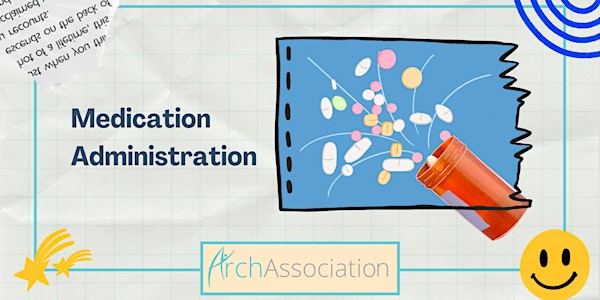
Medication Administration Training with Arch Association
Accessible Medication training for all skill levels in the NDIS.
Location
unit 2/82 Reid Promenade
82 Reid Promenade #unit 2 Joondalup, WA 6027 AustraliaRefund Policy
About this event
Boost your skillset with Medication Administration training from Arch Association.
Ensure the safety and well-being of individuals with disabilities through comprehensive training on medication management. Learn essential skills such as proper administration techniques, dosage calculations, adverse reaction recognition, and effective communication. Gain the confidence to handle various medication types and situations while adhering to legal and ethical standards. Elevate your caregiving expertise with our practical, hands-on approach to medication administration.
Full Course Description
A Medication Administration training course for disability support workers to ensure the safety and well-being of individuals with disabilities who require medication assistance. The course should cover a comprehensive range of topics to provide participants with the knowledge and skills necessary for safe and effective medication administration.
Module 1: Introduction to Medication Administration
- Importance of medication safety and administration for disability support workers.
- Legal and ethical considerations related to medication administration.
- Roles and responsibilities of disability support workers in medication management.
Module 2: Common Types of Medications
- Overview of common types of medications individuals with disabilities might take.
- Understanding different medication forms (tablets, capsules, liquids, inhalers, etc.).
- Reading medication labels and understanding prescription instructions.
Module 3: Medication Regulations and Documentation
- Overview of relevant legislation and regulations related to medication administration in Australia.
- Importance of accurate and complete documentation in medication management.
- Reporting adverse reactions and medication errors.
Module 4: Medication Storage and Handling
- Proper storage conditions for various types of medications.
- Techniques for handling medications safely, including hand hygiene and infection control.
- Preventing medication contamination and cross-contamination.
Module 5: Medication Administration Routes and Techniques
- Different routes of medication administration (oral, topical, subcutaneous, etc.).
- Proper techniques for administering medications through various routes.
- Special considerations for individuals with swallowing difficulties or sensory impairments.
Module 6: Dosage Calculations and Measurement
- Understanding medication dosages and calculating correct dosages based on prescriptions.
- Techniques for accurate measurement of medications, especially with liquid forms.
- Using medication administration devices, such as syringes, droppers, and pill organisers.
Module 7: Adverse Reactions and Allergies
- Identifying common adverse reactions to medications.
- Recognising signs of allergies and anaphylaxis.
- Steps to take when an adverse reaction occurs.
Module 8: Interactions and Side Effects
- Understanding potential drug interactions and their implications.
- Common side effects of medications and how to manage them.
- Communication with healthcare professionals about medication-related concerns.
Module 9: Communication and Collaboration
- Effective communication with individuals with disabilities and their families.
- Collaborating with healthcare providers, pharmacists, and other team members.
- Sharing relevant information about medication administration and changes.
Module 10: Practical Skills and Simulation
- Hands-on practice of medication administration techniques on training equipment or mannequins.
- Simulation scenarios to simulate real-life situations disability support workers might encounter.
- Feedback and guidance from trainers to improve skills.
Module 11: Medication Management Plans
- Developing and implementing individualized medication management plans.
- Importance of person-centered care and respecting individual preferences.
- Regular assessment and adjustment of medication plans.
Module 12: Recap and Assessment
- Review of key concepts and skills covered throughout the course.
- Assessment to evaluate participants' understanding and competence in medication administration.
To learn more about Arch Association, visit our website.